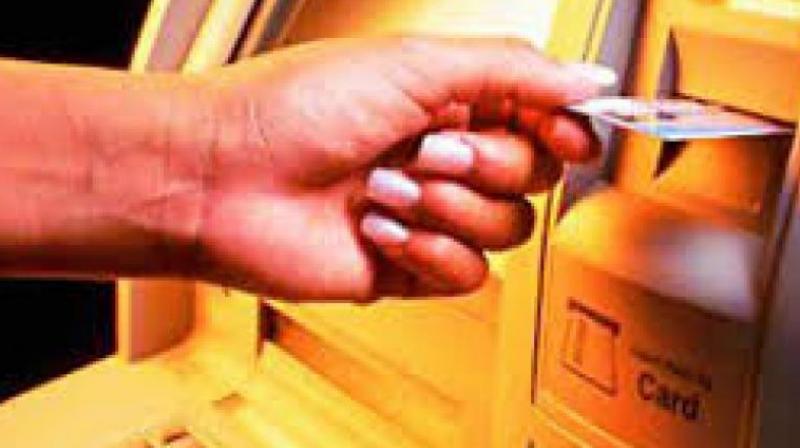Hyderabad: 40 per cent of ATMs in the twin cities closed post-demonetisation
Sudden fall in availability of Rs 2,000 notes in past 3 months.

Hyderabad: Over 40 per cent of the ATMs in the twin cities have shut down after the demonetisation implemented by the BJP-led Central government.
There are several reasons for this, be it increase in online transactions, SBI-SBH merger, the Financial Resolution and Deposit Insurance Bill and lack of trust in banks. Officials also claimed that people had lost faith in banks and are not depositing cash there anymore. Also, surprisingly, the number of Rs 2,000 notes have gone down in the last three months.
There were about 3,000 ATMs in the city, maintained by both public and private sector banks. Out of these, 2,500 were onsite ATMs, being located within the bank premises. Sources in the Reserve Bank of India said that since demonetisation, shortage of cash has hit banks badly.
Each ATM used to have five trays for dispensing cash, two for Rs 1,000 notes, two more for Rs 500 notes and the remaining one for cash of smaller denomination.
But post-demonetisation, as many as 2,27,000 ATMs across the country were shut down for recalibration to be able to dispense the new Rs 2,000 notes. An engineer and a helper have to manually visit each ATM for this.
But this proved to be a Herculean task and, as a result, several had to shut down. Introduction of FRDI and Goods and Services Tax further aggravated the problem.
Fearing heavy taxes and ambiguity over their deposits, bank customers were reluctant to deposit cash. As a result, banks ran out of cash at least four times and the problem has become severe in the twin cities.
All India Bank Employees’ Association secretary B. S. Rambabu said that running ATMs has hit banks badly. He said maintenance of each ATM costs around Rs 50,000 per month, which includes Rs 10,000 as wages for three guards, Rs 10,000 towards rent and Rs 10,000 towards video vigilance and electricity.
“To be profitable, at least 125 transactions should take place every day at the ATMs. However, because of cash crunch, several banks went on an undeclared closure, being unable to bear the expenses,” he said.
Mr Rambabu said even though maintenance was handed over to two private agencies, they submitted a memorandum to the RBI claiming they cannot maintain ATMs at the current transaction rate and all ATMs in the country would be shut down within two years if the situation prevails.
Asked about shortage of Rs 2,000 notes in the market, Mr Rambabu said introduction of GST has reduced business transactions through banks over fear of taxes. “Of total number of notes printed post-demonetisation, 38.5 per cent were Rs 2,000 notes. People with unaccounted money have been holding the notes after withdrawal. Only minimal amount has come back to the banks,” Mr Rambabu said.
He explained that since Rs 2,000 notes help in a big way to make huge offline payments, most were pumped into the real estate market and their number has further declined after the recently Assembly elections. Sale deeds in real estate transactions might show Rs 3 lakh, but off the record about Rs 50 lakh transaction will be made,” he said.
A. Satyanarayana, a retired employee, said he has lost faith in banks since demonetisation and the FRDI Bill. “We save money in banks for future requirements.
During note ban, I was forced to cancel my daughter’s engagement because of cash shortage. FRDI bill came as another jolt. Why will I authorise banks to invest my savings in some other sector. I withdrew all my savings and locked them up at home,” he said.
He feels his savings were no longer safe in banks and neither can he queue up outside ATMs to withdraw cash.
Yamusani Venkatesh, a wholesale merchant in Begum Bazaar, said: “Why should I carry out bank transactions and be charged every time afterwards. We make 100 transactions across the state daily and can save tax money levied by banks after five transactions,” he added.

